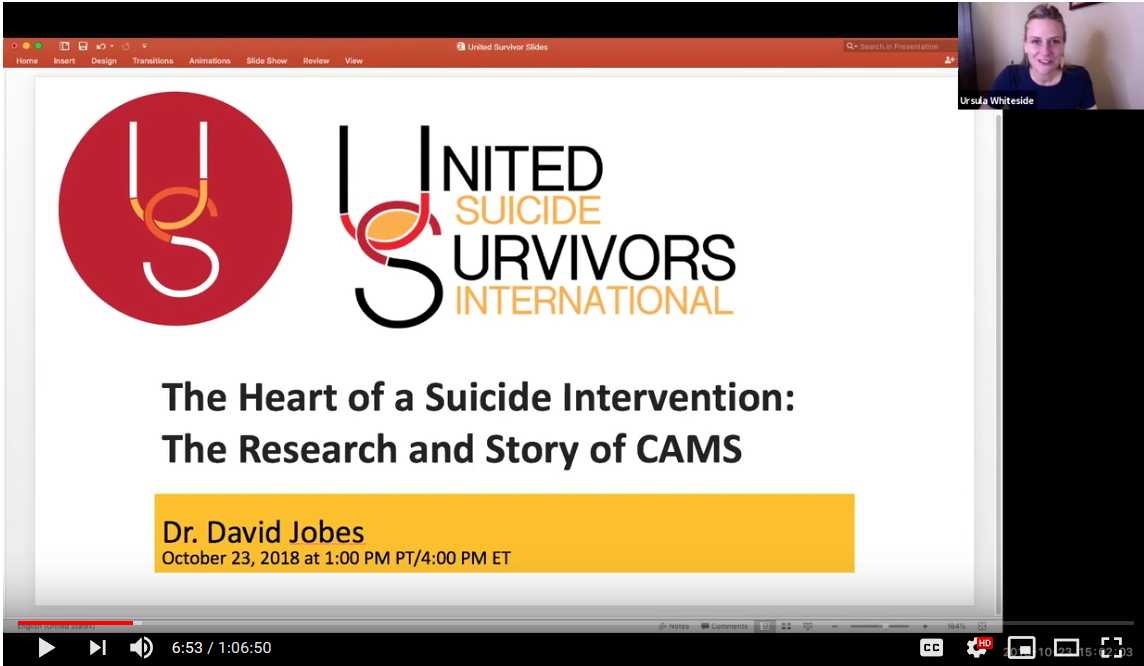Suicidology Resources & News
The latest in suicide prevention news, articles, resources, and other materials related to CAMS-care suicidology.
News From CAMS-care
In 2019, the CAMS-care team will be involved in a range of events across the U.S. and Internationally.
FEATURED RESOURCE
A STEPPED CARE APPROACH TO CLINICAL SUICIDE PREVENTION
As developed by Dr. David Jobes, a “stepped care” approach to suicide prevention is evidence-based, least-restrictive, and cost-effective. In this article, written by Dr. Jobes, learn how a systems-level approach using evidence-based care, such as CAMS can make a major difference in clinical suicide prevention.
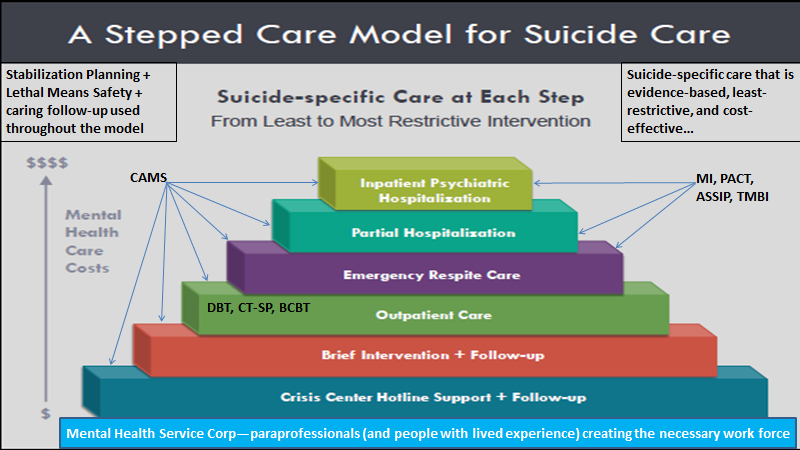
Lowcountry Mental Health Conference
August 1 – 2
Charleston, SC
Dr. David Jobes will be giving the keynote speech at the Lowcountry Mental Health Conference August 1st. His presentation will emphasize suicide-specific assessments, interventions, and treatments that have been proven to work in rigorous clinical trials.
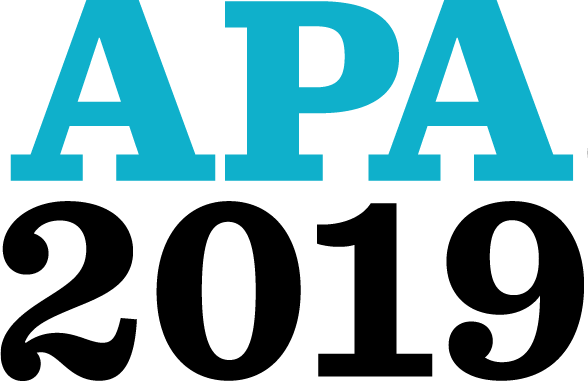
APA 2019 Convention
August 8 – 11
Chicago, IL
CAMS-care consultant Kurt Michael, PhD, will be hosting a CE workshop, “The Intersection of Media Portrayals of Suicide and the Science of Suicide Prevention” at the APA Convention on August 8. This workshop provide guidelines for effective and ethical practices of suicide prevention. Enrollment is limited.
NEW BILL WILL TRY TO HELP SLOW YOUTH SUICIDE IN COLORADO
A new bill just introduced to Colorado lawmakers is designed to make mental health and behavioral resources more accessible to younger children and families in schools across the state.
CAMS-CARE STUDENT SCHOLARSHIP
The CAMS-care Student Scholarship was first announced at the 50th Annual Conference of the American Association of Suicidology by CAMS-care Co-Owners Dr. David Jobes and Ms. Colleen Kelly. The CAMS-Care student scholarship is meant to support deserving matriculated students who are interested in attending the AAS Annual Conference.

2019 WINNER CAMS-CARE STUDENT SCHOLARSHIP T0 AAS
Christie Leslie is a second-year master’s student at Penn State Erie, the Behrend College. She is currently studying suicidal ideations in college students, interns at a local crisis center, and works with children at a residential treatment facility. The AAS Conference will allow her to share her independent research, learn more information about a field she is passionate about, and learn how to better work with her clients.
AMERICAN PSYCHOLOGICAL ASSOCIATION’S (APA) MONITOR ON PSYCHOLOGY
CAMS-care was recently recommended as a trusted resource for mental health professionals in the March 2019 edition of the American Psychological Association’s (APA) Monitor on Psychology, a leading authority in the industry. The article, entitled “Worrying Trends in U.S. Suicide Rates” noted a 33% increase in suicide rates from 1999 to 2017 in the U.S. while at the same time rates have decreased in other countries. The National Action Alliance for Suicide Prevention standards of care for suicidal individuals recommends assessing patients risk of suicide at intake and ongoing throughout treatment, completing a safety plan which is reviewed and updated each session until risk is reduced, providing resources in case of crisis, and reducing access to lethal means. The CAMS framework provides clinicians and patients with a structured collaborative format to meet these standards of care. Research demonstrates that both patients and therapists like the CAMS framework and clinicians and risk of suicide, on average, is reduced within six to eight sessions of CAMS.
JOURNAL OF AFFECTIVE DISORDERS
A group in Oslo, Norway recently studied managing suicidality within specialized care, including patients from two crisis centers, three inpatient units and two regular inpatient units. The study found that “CAMS improved treatment outcome on suicide ideation and mental health distress more rapidly and in a sustained manner when compared to treatment as usual.” This study is currently in press at the Journal of Affective Disorders.

UNITED SURVIVORS INTERNATIONAL WEBINAR
Dr. Jobes recently participated in a webinar with United Survivors International which is an independent international grass roots organization that serves as a home for people who have experienced suicide loss, suicide attempts and suicidal thoughts and feelings, and their friends and families — collectively known as people with Lived Experience with suicide – to leverage their expertise for large scale change. Dr. Jobes has known the founders for many years and they ask various experts to participate in webinars like this one. This one has reportedly been very successful with thousands of participants when it was aired on Facebook.
Recommended Standard Care
for People with Suicide Risk: MAKING HEALTH CARE SUICIDE SAFE
This set of recommendations was created by an expert task force to help raise the clinical standard of care across treatment settings with sensible evidence-based approaches. The recommendations emphasize the used of assessment, lethal means safety, the use of the national lifeline, suicide-specific clinical care, and caring follow-up.
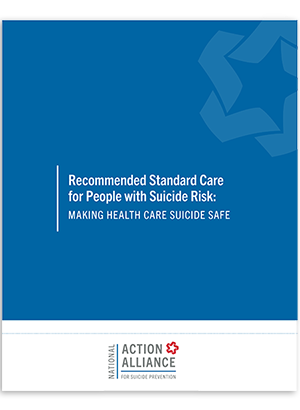
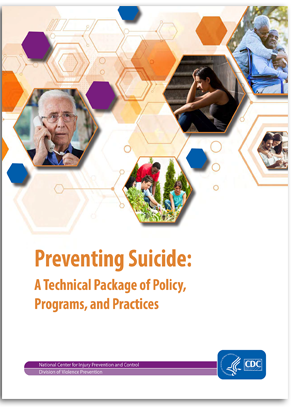
Preventing Suicide: A Technical Package of Policy, Programs, and Practices
The Centers for Disease Control released this document in 2017 to provide evidence-based guidance for increasing effective suicide prevention. This technical package supports the goals and objectives of the National Strategy for Suicide Prevention and the National Action Alliance for Suicide Prevention’s emphasis on community-based prevention. CAMS in mentioned as a proven evidence-based clinical approach for effectively treating suicidal risk.
Detecting and Treating Suicide Ideation in All Settings
The Joint Commission released this Sentinel Event Alert in an effort to raise the stand of clinical care for suicidal risk in the United States within inpatient and outpatient care. The alert emphasizes the importance of suicide ideation detection and the direct treatment of suicidal risk along with follow up care. CAMS is mentioned as one of a handful of evidence-based suicide-specific practices that can be used to effectively identify and directly treat suicidal risk.

RESOURCES FOR CLINICAL SUICIDOLOGY
Books
There are various books on clinical suicidology that describe Dr. Jobes’ approach to assessing and treating suicidal risk with both adult and adolescent suicidal patients. Learn More
DVDS
There are various videos on clinical suicidology that describe Dr. Jobes’ approach to assessing and treating suicidal risk with both adult and adolescent suicidal patients. Learn More
